Bengt-Göran Rosén
Professor, PhD, Docent, i Produktionsteknik


Project time: 2017 – 2018
Budget: 260 000 kr
Målet var att förstå de utmaningar som den svenska och japanska industrin står inför studiebesök.
Manufacturing provides an important institutional foundation for learning and developing process skills, and enterprises which have capabilities that are intertwined with research are most important to the country’s economic growth. Hence benchmarking some of the manufacturing best practices from industries around the world would help in identifying improvement opportunities and create a competitive environment within the organization.
The main purpose of the PhD course “International Production” is to bring out the manufacturing practices from various industries globally and to provide an extensive report of the on-going methods. A group of PhD students from various Swedish universities visited some of the leading manufacturing companies in Sweden and Japan, to provide a comparative study of the manufacturing styles employed in the two countries based on the following focus areas:
• Digitalization and Industry 4.0
• Key Performance Indicators and Sustainability
• Quality Assurance and Integrated Product and Production Development
• Research Integration/Institutes
• Production Processes
This report provides a detailed explanation of the similarities and differences in the manufacturing companies between the two countries. With 23 PhD students and 17 industrial visits (both national and international), this overview report aims to provide a guideline for strategists and engineers in manufacturing planning and development. This course is a part of Produktion2030, a strategic innovation program supported by VINNOVA (Swedish Energy Agency and Formas). We would like to thank VINNOVA Strategic Vehicle Research and Innovation (FFI), Sustainable Production Programme and VINNOVA Production2030 Strategic Innovation Area for funding this course.
Failure prediction for complex load cases in sheet metal forming
2020 – 2023
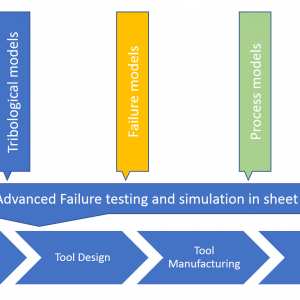
SCARCE II will develop a demonstrator to show how SMEs and associated value flows can increase efficiency, competitiveness, sustainability and internal collaboration through digitalisation. The goal is to show the value of a new digital solution. SCARCE focuses on two subcontractors in the value chain linked to Scania and Volvo. The demonstrator is a cloud-based solution that connects three test beds in the industry; Stena Industry Innovation Lab, Chalmers, RISE IVF lab, Mölndal and KTH's test bed in Södertälje with the help of Siemens, AFRY, Qbim, Virtual Manufacturing and EQPack.
2020 – 2022
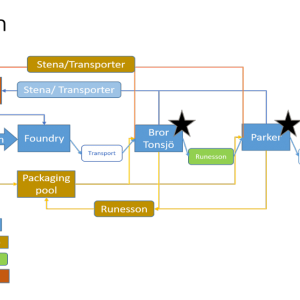
SCARCE will investigate the needs, possibilities and obstacles in value chains up- and down-stream from a focal SME company. SCARCE will explore what data to measure and visualize, and how this data can enable more automated execution, as well as, more dynamic and proactive planning of production capacity and material flows across the companies in the value chain. In addition, we will study organizational capabilities, especially the future human role, for implementing and managing in a digital and data-driven value chain.
2019 – 2019
The SQID project will develop an industrial cleaning and drying machine using Qlean water instead of traditional chemicals.
2016 – 2018
For more than a hundred years, lubricants for various types of machines have mainly been made from fossil oil. The function has improved over time, but they also have disadvantages; they negatively affect the environment, human health and the climate. The project will therefore work to improve the practical applications by, together with other tests, combining lab tests with field tests.
2021 – 2023

Indium is a silvery metal that is very soft and malleable. Together with tin, the metal can be used to create indium tin oxide with properties that make it one of the most important components in the electronics industry. The goal of the project is therefore to build a recycling unit in a continuous production without waste.
2021 – 2023

DiLAM strengthens the competitiveness of the Swedish manufacturing industry by aligning the digital and physical supply chains for additive manufacturing of large parts.
2017 – 2020
This project aims to contribute to the development of future ERP-systems. The project will explore how to offer work, redefine work roles and challenge companies to make use of advanced systems support and the technology within and around these. Overall, the project aims to contribute to the development of both the next generation of ERP-systems and a complementary change in the way firms see upon work organization, so that technology can support and meet the needs of the humans within organisations rather than enforcing structures upon them.
2019 – 2019
Urinary incontinence is a common problem that affects everyone, ranging from young women who have recently given birth to men who have undergone prostate surgery. Amongst people over the age of 70, almost half of everyone, both women and men, suffer from involuntary urine leakage.
2021 – 2023

Cyclicor, which has its origins at Lund University, has in a previous project within Mistra Innovation successfully developed a method for producing the plastics polycarbonate (PC) and polyurethane (PU) without toxic additives. One goal of the Polyfree 2.0 project is to increase the production of the new plastics from lab scale to quantities that enable the participating industrial companies in turn to take steps towards finished products. Other goals are for the plastics to be recyclable as well as have the required properties.
2021 – 2023

The project created a sustainable test bed that by provides Swedish industry with facilities and tools to physically and virtually evaluate different manufacturing concepts.
2013 – 2016
Improve the efficiency of sawmills, including improved monitoring and maintenance of the production line. This by sharing data via digital twin between the actors in the maintenance chain.
2019 – 2019
Urinary incontinence is a common problem that affects everyone from young women who have recently given birth to men who have undergone prostate surgery. Amongst people over the age of 70, almost half of everyone, both women and men, suffer from involuntary urinary leakage.
2021 – 2023
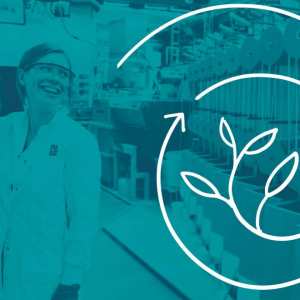
DIDAM develops and demonstrates digitalization solutions to industrialize Additive Manufacturing
2020 – 2023
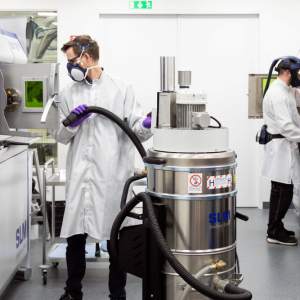
WELDVISI will create a new sensor-based assistance system for manual manufacturing with real-time cognitive feedback and documentation of parameters.
2022 – 2025
Tidsättning av manuell montering är centralt för verkstadsindustrins konkurrenskraft.
2021 – 2024

A new environmentally friendly process for production of graphene based on equipment normally used in pulp industry
2021 – 2021
The project aims to reduce the lead time for sheet metal die tryout by optimizing the value stream and develop methods for numerical compensation of die and press deflections.
2017 – 2019
2017 – 2018
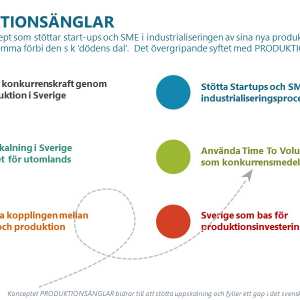
Resilient and sustainable production for proactive production development of greenfield/brownfield.
2021 – 2024

Method to understand how to automate information handling to get more efficient handling of production deviations.
2018 – 2020
Developing circular production systems using digital technologies
2021 – 2024

Novel methods, techniques and software for simulation of electrodeposition and galvanization processes.
2020 – 2023
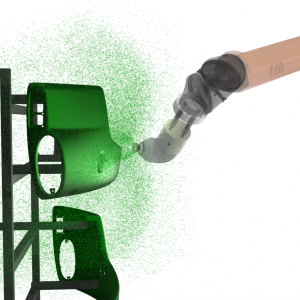
The project aims to use deviation data for improving the product design and production.
2020 – 2023
2013 – 2017
2015 – 2016
The project will develop a concept for production workers to easily build simple low-cost IoT-aided improvement solutions at the production shop floor.
2018 – 2020
The aim is to enable increased use of recycled material in polymer parts and to increase service life of products.
2022 – 2023
To demonstrate the new technology with robots that enable Swedish companies to develop innovative new products for automated production o maintenance.
2017 – 2020
A large number of building boards are used in both construction and furniture manufacturing. They are usually made of sawdust with a formaldehyde-based adhesive as a binder. However, they have some problems, including the fact that shavings absorb moisture and that formaldehyde is both allergenic and potentially carcinogenic. The LigniGC project aims to develop a better alternative.
2021 – 2023
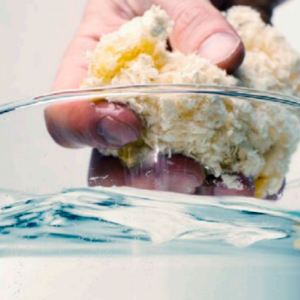
Reduce the environmental impact of foundries by reducing the amount of sand waste using machine learning.
2023 – 2024
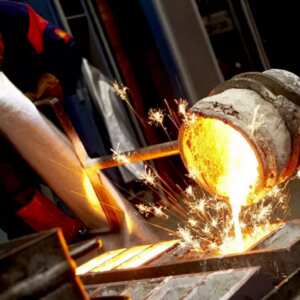
DiVISI aims at investigating how sharing of digital information can improve the forest-forest industry value chain.
2020 – 2023
The paintshop is often a bottleneck in production and the processes are fine-tuned based on testing on numerous prototypes. To meet the future demands there is a great need to improve the product preparation process. The aim is to develop methods, techniques and software, and supporting measurement methodology, for simulation of paint curing in IR and convective ovens. The goal is to assist the industry to further develop and optimize their surface treatment to be more energy and cost efficient; to have a shorter lead time in product development; and to give a higher product quality.
2016 – 2019
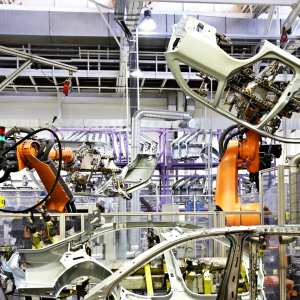
The project aims at facilitating the implementation of Smart Maintenance through extended collaboration within the maintenance community.
2017 – 2019
The project aims at radically improving the working environment and the employee security within the heavy manufacturing industries by using and adapting the latest technology for low and ultraprecise positioning and decision support systems. The target is to increase security and safety by adapting the decision-support and positioning system for the heavy manufacturing industries.
2017 – 2018
Two major disruptive trends – electrification and digitalization are changing customer preferences, leading to the probably most substantial transformation in the automotive industry we observed in decades. Finding a balance between customer’s requirements towards “zero-emission vehicle,” “connected car,” choice of materials, clarity of functions, and interface modes under the pressure of production time and cost are not easy. The AttributDo-project aims to help engineers create, define, verify and validate new and existing design features for new product development.
2021 – 2021
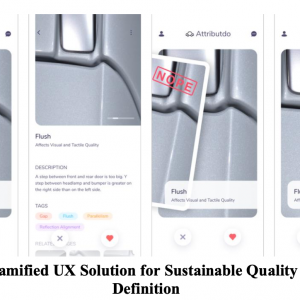
The overall goal of DiSAM is to create a unique test AM Hub in Sweden for metal and polymer based additive manufacturing processes.
2017 – 2021
The project aims a digitising the temperatures during the casting of rolls and suggest actions to the casting manager to reduce the variability of the process
2015 – 2016
The project aims to digitalize established tools for production disturbance handling.
2018 – 2020